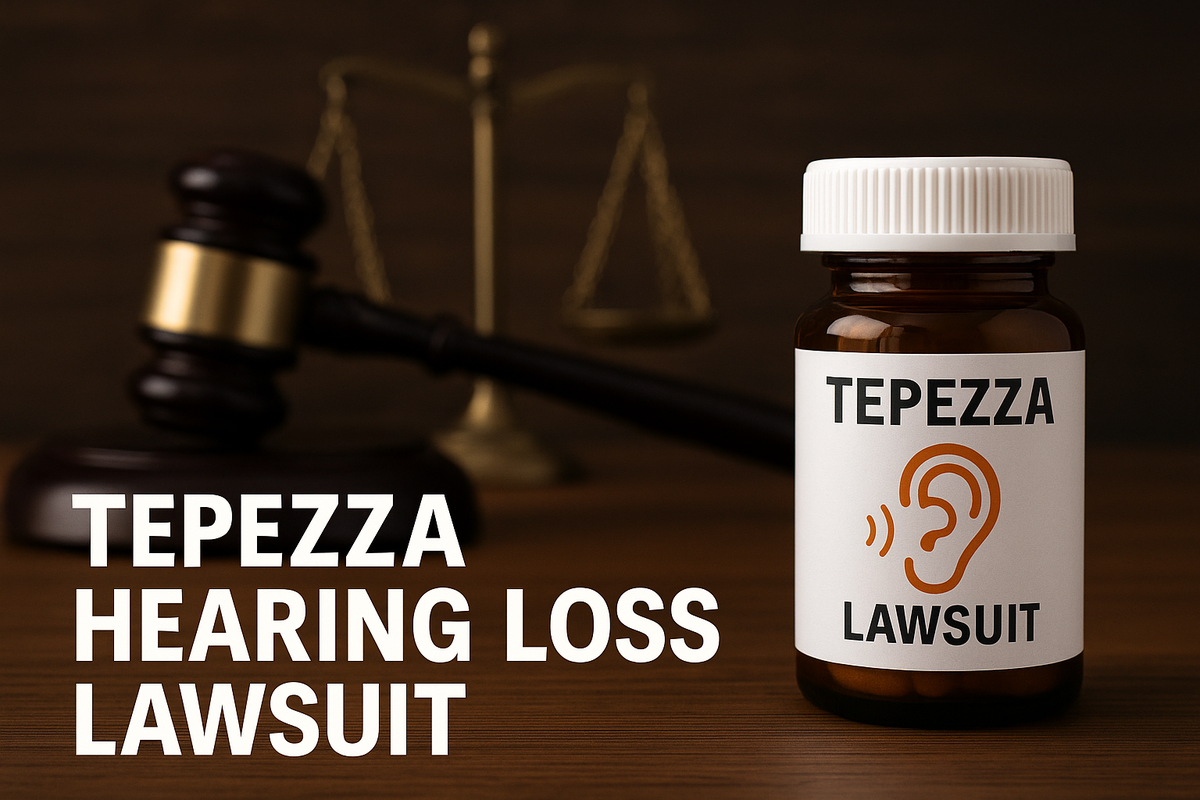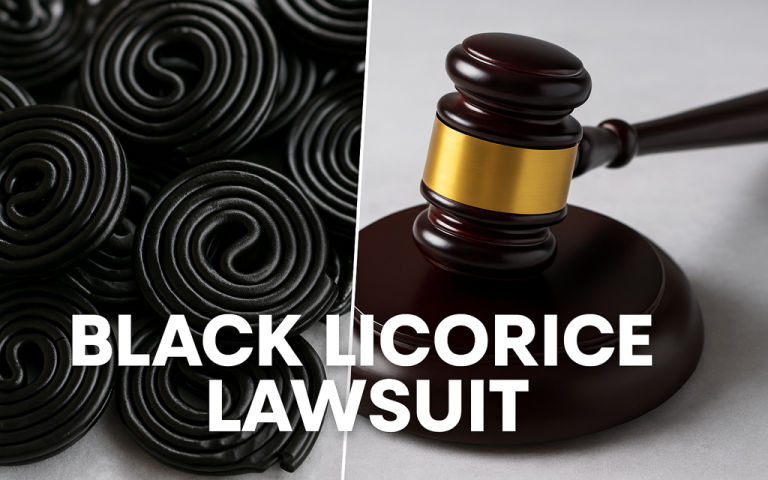The Tepezza hearing loss lawsuit points out how sudden drug side effects can turn lives upside down. Tepezza, cleared in 2020, was the initial therapy specifically for Thyroid Eye Disease (TED). To many, it provided genuine promise. However, barely months after hitting the markets, whispers about hearing issues related to treatment emerged. Patients who had ringing in their ears, hearing loss, or permanent ear damage started looking for legal solutions.
Most claim they were never informed of the dangers. Some got long-term injuries that altered their way of life. The lawsuits are attempting to hold the manufacturer responsible. This article discusses what the drug does, why people are filing lawsuits, who is eligible, and what to do if you are impacted. You will also get the latest court news and how to pursue legal action.
What Is the Tepezza Drug and How Does It Work?
Understanding how Tepezza works helps explain why so many patients were eager to use it.
What Condition Does Tepezza Treat?
Tepezza was approved to treat Thyroid Eye Disease. TED causes inflammation behind the eyes. This results in bulging eyes, double vision, pain, and even vision loss. Before Tepezza, treatment options included steroids, radiation, or surgery. These methods came with risks and limited success. Tepezza gave patients a new, less invasive option.
How Does Tepezza Function Inside the Body?
Tepezza blocks a receptor known as IGF-1R. This receptor affects inflammation in the tissues behind the eyes. When Tepezza blocks it, inflammation decreases. As a result, pressure on the eyes lowers, and symptoms improve. For many, this meant relief without surgery.
Why Was It Considered a Breakthrough?
Tepezza was the first FDA-approved drug for TED. It filled a major gap in treatment. Patients and doctors were optimistic. Clinical trials showed reduced symptoms in many users. The success led to fast market adoption. But that excitement came with overlooked risks.
What Hearing Problems Are Reported in the Tepezza Hearing Loss Lawsuit?
The more patients used Tepezza, the more they reported hearing issues. These complaints grew louder as more people spoke out.
What Types of Symptoms Did Patients Experience?
Many users developed hearing symptoms. These included ringing in the ears, known as tinnitus, and muffled or distorted hearing. Others felt ear pressure or experienced sudden hearing loss. In some cases, hearing damage continued long after the treatment ended. Some required hearing aids or additional medical treatment.
What Do Clinical Studies Show?
Reports are supported by studies. In 2021, a study published in Endocrine Practice concluded that approximately 65% of patients reported hearing-related side effects. Stanford Medicine validated in 2022 that most of these were permanent. The findings contradict Horizon’s previous assertions that side effects were temporary. Evidence, which has increased over time, has fueled the lawsuits.
Why Are People Filing the Tepezza Hearing Loss Lawsuit?
The lawsuits didn’t come immediately. But as more accounts came out, patients started calling for accountability.
What Legal Charges Are Being Filed?
Individuals are suing because they feel that Horizon did not give adequate warnings. Legal charges include failure to warn, product liability, negligence, and breach of warranty. Plaintiffs claim they weren’t informed of the complete risks. They claim Horizon ought to have warned of permanent hearing loss earlier.
Was the Drug Label Misleading?
When Tepezza first came out, the drug label mentioned hearing problems as “temporary.” But patient reports and studies showed some hearing loss was lasting. The company updated the warning label in 2023. Many believe that update came too late. This delay in action is a key argument in the lawsuits.
Who Is Eligible to File a Tepezza Hearing Loss Lawsuit?
People want to know if they qualify to file. Many are unsure how their experience fits into the legal case.
What Makes You Qualified to Join?
You may be eligible if you received Tepezza infusions and later experienced hearing problems. These problems must have lasted beyond treatment. You must also show that you were not warned about the risk. Most lawsuits involve people who used the drug exactly as prescribed and still suffered harm.
What Evidence Do You Need?
Good evidence can help strengthen your case. You’ll need medical records showing Tepezza was prescribed and hearing tests that prove damage. It helps to have a timeline of when your symptoms started. Doctor notes and personal accounts of how the hearing issues affected you also support your claim.
What Can You Recover from a Tepezza Lawsuit?
Plaintiffs usually want to know what they can recover from a lawsuit.
What Kind of Damages Am I Covered For?
Compensation can encompass a range of expenses. These are medical expenses associated with diagnosis and treatment, devices such as hearing aids, and future care expenditures. If your hearing loss impacted your work capacity, you can also pursue lost income. Emotional suffering and interference with your daily life could also be covered under the claim. Courts try to put victims back to where they were prior to treatment.
What’s the Latest News on the Tepezza Hearing Loss Lawsuit?
High numbers of people are following the case to observe how courts will handle these mounting complaints.
Where Are the Cases Being Tried?
In June 2023, the Judicial Panel on Multidistrict Litigation established a Tepezza MDL in the Northern District of Illinois. This consolidated numerous similar cases into a single legal process. It helps to accelerate early stages and make decisions more consistent.
Are Trials Scheduled?
Lawyers expect early trials to begin in 2026. These are called bellwether trials. The results will help shape other cases. A win for early plaintiffs may lead to faster settlements for others. Courts are still reviewing evidence and setting timelines.
How Has the Manufacturer Responded?
Horizon and its new parent company have issued public statements, but legal teams argue these are not enough.
Did Horizon Admit Fault?
Horizon says the benefits of Tepezza outweigh the risks. The company denies wrongdoing. It updated the label in 2023 but only after public and scientific pressure. Patients argue that earlier studies showed warning signs. They believe the company waited too long to act.
What About the Amgen Acquisition?
Amgen purchased Horizon for $28 billion in 2023. Amgen now owns the rights to Tepezza. As the lawsuits grow, Amgen may face legal exposure. Courts may need to decide whether the new parent company shares responsibility for the old company’s actions.
What Should You Do If You’ve Suffered Hearing Loss from Tepezza?
If you’ve experienced symptoms, it’s important to act quickly. Gathering the right documents makes a difference.
What Are the Next Steps?
See a hearing specialist for an exam. Keep your records from your Tepezza treatment. Note when symptoms began and how they affect your life. Then speak with a lawyer. Many law firms offer free case reviews. They can help you decide whether to file and what steps to take.
Comparing Official Claims vs. Real-World Reports
| Category | Horizon’s Original Claim | Medical Findings |
|---|---|---|
| Hearing loss type | Temporary | Often permanent |
| Reported frequency | Less than 10% | Over 60% in studies |
| Label warning issued | Vague mention (2020) | Updated warning (2023) |
| Manufacturer stance | Defended product | Patients demand accountability |
FAQs About the Tepezza Hearing Loss Lawsuit
Is Tepezza still FDA approved?
Yes. It remains approved. The drug label now includes a warning about permanent hearing loss.
How long do I have to file?
It depends on your state. Most deadlines fall between one and three years from the time you discovered your injury.
Can I still file if my hearing improved?
Yes. If your hearing problems lasted for any period or needed treatment, you may qualify.
Do I need a lawyer?
Yes. A lawyer can help you file your claim, gather evidence, and avoid missing deadlines.
Conclusion
The Tepezza hearing loss lawsuit shows how serious side effects can be overlooked when drugs hit the market. Patients trusted a treatment that promised relief. They were not told that the same drug could damage their hearing. Now they want justice and support.
If Tepezza harmed your hearing, you may be entitled to file a claim. Start by getting a full medical exam. Keep records. Then contact a lawyer. Taking action now may help you recover the support you need and deserve.




